Populism
Getting A Step Ahead of the Tyrants: One TikTok at A Time
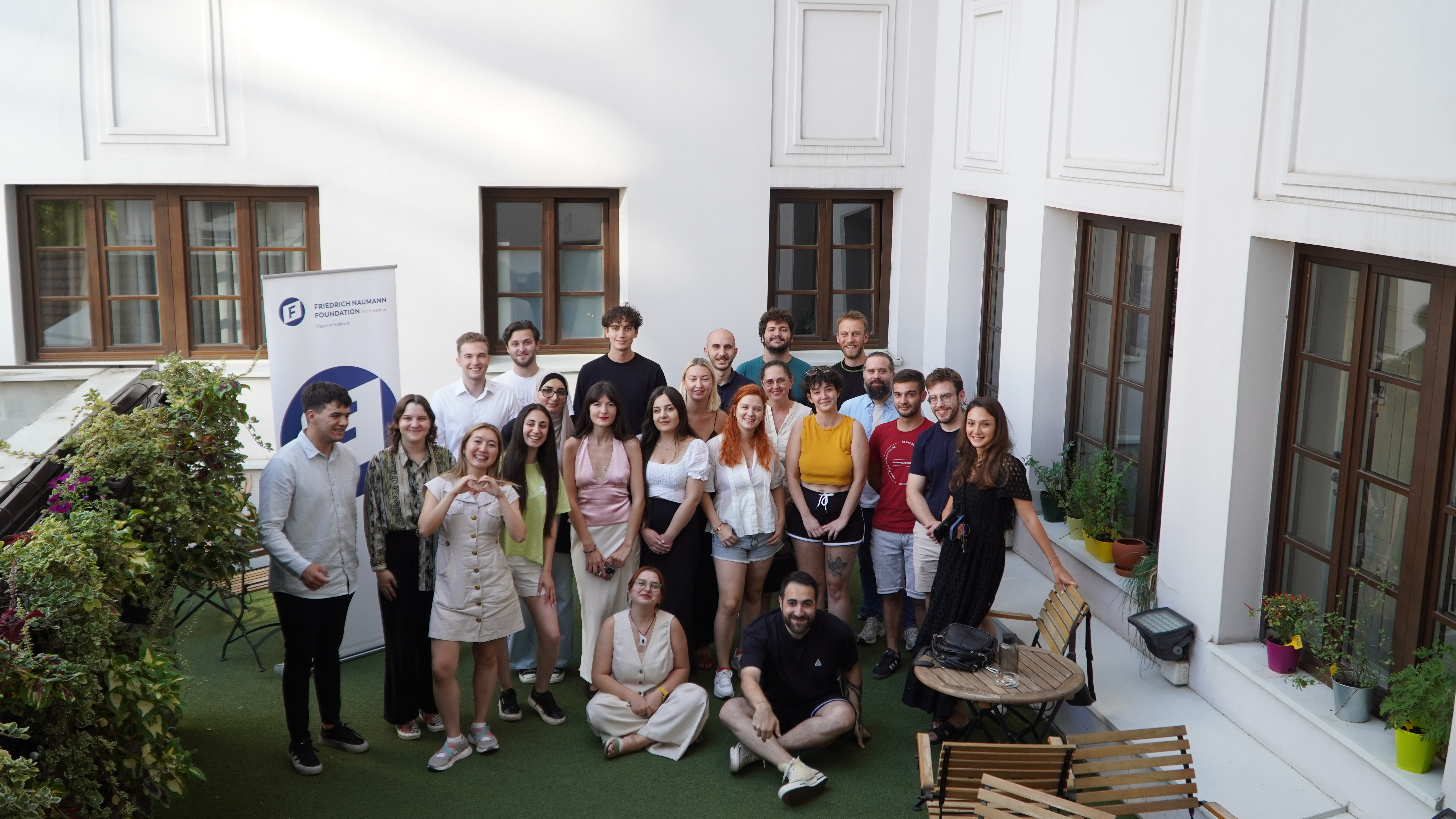
Millennial Takeover 2024 Alumni
© FNFThe world no longer holds the promise of a better tomorrow. The liberal narrative of progress has faded, replaced by a reality where hope for improvement feels increasingly out of reach. Millennials today face a daunting reality—lacking leadership, financial security, property, and power. Young people are at a disadvantage in the current political and economic systems, making their role in combating populism all the more crucial.
The overarching theme of the 5th Millennial Takeover was “Getting A Step Ahead of the Tyrants: One TikTok at A Time.” The programme to tackle the rising challenges of populism and authoritarianism gathered young leaders from Armenia, Bosnia and Herzegovina, Bulgaria, Georgia, Kosovo, Moldova, Romania, Serbia, Türkiye, Ukraine. Not only did this seminar help participants to deconstruct populism in a holistic manner; but as well empowered them to always be one step ahead of the populists. It offered a mix of theory and practice with a particular focus on short-form video content and modern political communication strategies to counter populist narratives and defend democratic values.
Populism is a reaction to liberalism.
As the program’s facilitator, Sven Gerst explained, populism is not just a political trend; it is fundamentally anti-pluralist at its core. It thrives by undermining the very essence of democracy, systematically targeting diversity, civil society, and the rule of law. Populist leaders often claim to represent “the people,” but in doing so, they reject the multiplicity of voices and ideas that are central to a functioning democracy. Instead of embracing pluralism, they seek to homogenise political discourse, portraying themselves as the sole legitimate voice.
Furthermore, Gerst’s detailed comparison between populism and authoritarianism offered further insight into the complex relationship between these two forms of governance. While authoritarianism is more overt in its suppression of freedoms, populism is subtler, often disguising its authoritarian tendencies under the guise of democracy. Populist leaders may come to power through democratic elections, but once in office, they erode institutions from within—slowly concentrating power, weakening judicial independence, and undermining free media. This erosion is often gradual, making it harder to recognize until significant damage has been done.
This understanding of populism was further deepened through interactive exercises like the Populist Tier Maker. In this activity, participants ranked various populist leaders, analysing the specific strategies they employ to maintain control.
Populism may be left, may be right, but usually it’s just wrong.
One of the key components of the event was the development of an Anti-Populist Playbook. Participants were divided into groups to explore detailed case studies, examining the strategies commonly used by populist figures to maintain power. These sessions, led by experts, focused on tactics such as leveraging nationalist sentiments and exerting control over the media. Each group analysed various approaches employed by populists, gaining insights into how they manipulate democratic systems for their advantage.
Democracy does not run. However, it reaches the goal slowly, but surely.
Through interactive discussions and expert insights, the participants dissected how these tactics—such as creating political alliances, using "us vs. them" rhetoric, and pushing traditional values—erode democratic institutions while keeping a facade of legitimacy. By examining how populism manifests in different political contexts—from the nationalism-driven policies of Eastern Europe to the religious rhetoric seen in Türkiye— the group was able to see that while the outward tactics may differ, the underlying principles of populism remain strikingly similar. This exercise allowed participants to compare and contrast the methods used by populists in different countries, shedding light on how these leaders manipulate democratic structures to strengthen their grip on power, all while presenting themselves as champions of the people
Twisting Hayek, we must make the protection of a free society a cool rizz, now, one video at a time
Another key part of the learning journey was the video arts lab led by Kuest Media, where [participants learned how to use short-form video content to fight populist narratives. The hands-on experience allowed them to experiment with creative storytelling techniques and digital tools, which are becoming increasingly important in the modern fight against populism. By the end of the programme, the young leaders left with practical skills and a fresh sense of empowerment, ready to put the new knowledge to work in shaping the future of democracy.
Storytelling is not a science. It is an art. it has principles, not laws.
The final evening concluded with a graduation ceremony, offering a fun and lively end to an intense and enriching program. The group enjoyed music, dancing, and laughter, bringing a sense of camaraderie to the forefront. Beyond just fun, the night symbolised the closing of a transformative experience, where participants not only gained valuable skills and insights but also left with a network of inspiring contacts. Armed with newfound knowledge and connections, the group departed, ready to take on the challenge of defending democracy and shaping a better future.
Democrats shall never compromise with authoritarianism. They shall also find effective ways to counter fake news and authoritarian manipulation of social media.
Millennial Takeover Programme
The event took place from August 28 to September 1, 2024, in Belgrade, Serbia. Special gratitude goes to all organizers. experts, resource people and facilitator:
✅ Lead Facilitator: Sven Gerst, Political Philosopher; Former Secretary General of IFLRY, Germany
✅ Jelena Banjac, Politician, PSG Party, Serbia
✅ Raša Nedeljkov, CRTA Program Director, Serbia
✅ Jovan Jovanović, Politician and Diplomat, Serbia
✅ Elif Güney Menderes, Program Manager, FNF Türkiye. Vice-President in Charge of Field Coordination, Democracy and Progress (DEVA) Party, Türkiye
✅ Medeni Sungur, Trainer, Founder & CEO, Kuest Media, Türkiye
✅ Mustafa Aslan, Trainer, Creative Lead, Kuest Media, Türkiye
For 5 years now, The Millennial Takeover (MT) has become a well-respected flagship empowerment programme for young leaders from East Europe to address pressing issues in the digital era. Through workshops, discussions, and team-building activities, participants delve into topics such as populism, tech monopolization, fake news, hate speech, and data-driven campaigning. The programme aims to foster collaboration and empower participants to shape the future by sharing knowledge and developing practical skills in a relaxed and supportive environment. The network of alumni is a vibrant community of like-minded liberal individuals.
The #MT2024 event was collaboratively organized by the regional office for FNF East and Southeast Europe, FNF Türkiye and wonderfully hosted by FNF Western Balkans. The programme was first created and ran for several years by FNF Türkiye. Growing in impact and popularity, MT moved as a best practice to regional level, to FNF ESEE.
The programme is guided by Sven Gerst, an experienced facilitator and resource person. He spends a lot of his time at the International Academy of Leadership (IAF) of the Friedrich Naumann Foundation for Freedom. He is former Secretary General of the International Federation of Liberal Youth. During his work in international politics, Sven has worked with more than 50 political parties, NGOs, and think tanks from all over the world on strategic communication and capacity building. He holds a M.Sc. in Philosophy from the London School of Economics and Political Science as well as a M.Sc. in Management from the University of Mannheim. Previously, he also studied and worked at Harvard University, Duke University, St. Petersburg State University, and National Taiwan University.
Authors
Kardelen Deniz, Projects Officer, Daktilo 1984 Association
Boryana Atanassova, Senior Communications Manager, FNF East and Southeast Europe

Millennial Takeover 2024: Sven Gerst
© FNF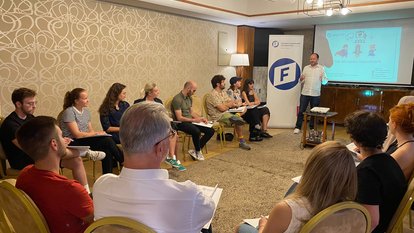
Millennial Takeover 2024: Opening by Markus Kaiser, Director of FNF Western Balkans
© FNF
Millennial Takeover 2024: Raša Nedeljkov, CRTA Program Director, Serbia
© FNF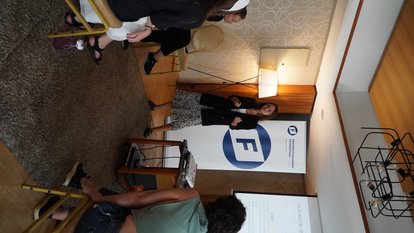
Millennial Takeover 2024: Elif Güney Menderes, Program Manager, FNF Türkiye. Vice-President in Charge of Field Coordination, Democracy and Progress (DEVA) Party, Türkiye
© FNF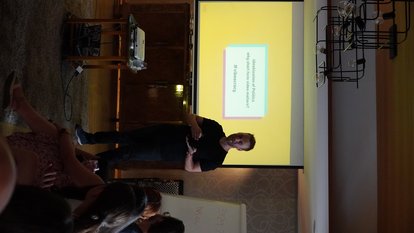
Millennial Takeover 2024: Medeni Sungur, Trainer, Founder & CEO, Kuest Media, Türkiye
© FNF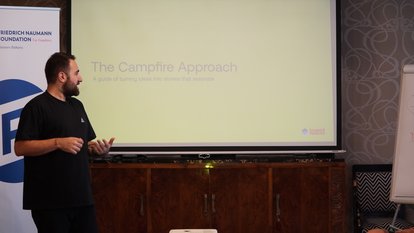
Millennial Takeover 2024: Mustafa Aslan, Trainer, Creative Lead, Kuest Media, Türkiye
© FNF
Millennial Takeover 2024 Graduation
© FNF
Millennial Takeover 2024 Graduation
© FNF
Millennial Takeover 2024 Group Work
© FNF